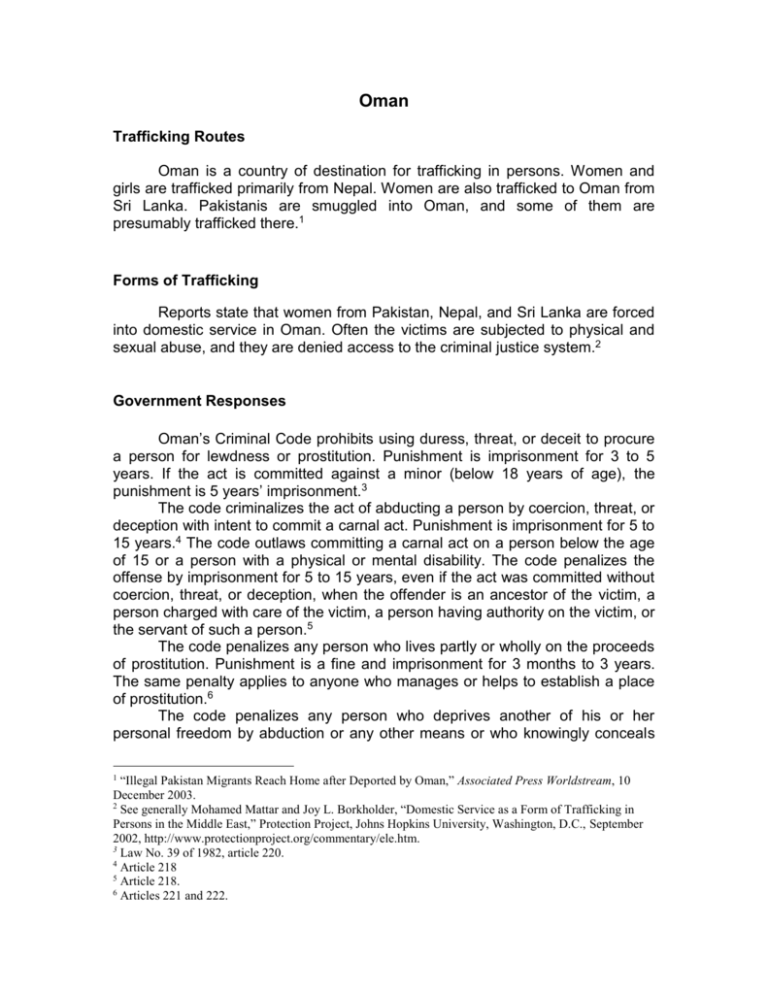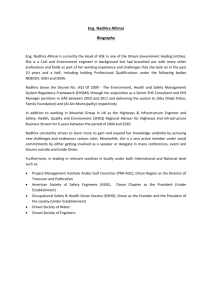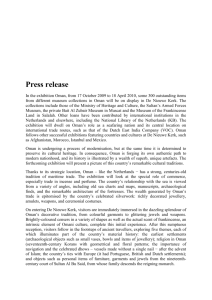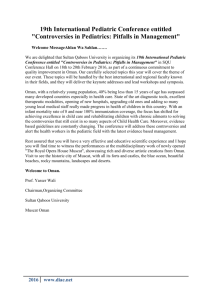Central African Republic
advertisement

Oman Trafficking Routes Oman is a country of destination for trafficking in persons. Women and girls are trafficked primarily from Nepal. Women are also trafficked to Oman from Sri Lanka. Pakistanis are smuggled into Oman, and some of them are presumably trafficked there.1 Forms of Trafficking Reports state that women from Pakistan, Nepal, and Sri Lanka are forced into domestic service in Oman. Often the victims are subjected to physical and sexual abuse, and they are denied access to the criminal justice system.2 Government Responses Oman’s Criminal Code prohibits using duress, threat, or deceit to procure a person for lewdness or prostitution. Punishment is imprisonment for 3 to 5 years. If the act is committed against a minor (below 18 years of age), the punishment is 5 years’ imprisonment.3 The code criminalizes the act of abducting a person by coercion, threat, or deception with intent to commit a carnal act. Punishment is imprisonment for 5 to 15 years.4 The code outlaws committing a carnal act on a person below the age of 15 or a person with a physical or mental disability. The code penalizes the offense by imprisonment for 5 to 15 years, even if the act was committed without coercion, threat, or deception, when the offender is an ancestor of the victim, a person charged with care of the victim, a person having authority on the victim, or the servant of such a person.5 The code penalizes any person who lives partly or wholly on the proceeds of prostitution. Punishment is a fine and imprisonment for 3 months to 3 years. The same penalty applies to anyone who manages or helps to establish a place of prostitution.6 The code penalizes any person who deprives another of his or her personal freedom by abduction or any other means or who knowingly conceals “Illegal Pakistan Migrants Reach Home after Deported by Oman,” Associated Press Worldstream, 10 December 2003. 2 See generally Mohamed Mattar and Joy L. Borkholder, “Domestic Service as a Form of Trafficking in Persons in the Middle East,” Protection Project, Johns Hopkins University, Washington, D.C., September 2002, http://www.protectionproject.org/commentary/ele.htm. 3 Law No. 39 of 1982, article 220. 4 Article 218 5 Article 218. 6 Articles 221 and 222. 1 an abducted person. The punishment is imprisonment for 6 months to 2 years. 7 If the abduction occurred by force, coercion, or seduction, or if the abducted person was forced to practice prostitution, the abductor is subject to imprisonment for not less than 15 years.8 The code outlaws deporting or putting a person in a state similar to slavery. The punishment is imprisonment for 5 to 15 years.9 In addition, anyone who disposes of another person or receives, possesses, acquires, or maintains another person in a state of slavery, whether entering or leaving the territories of Oman, is punished with imprisonment for 3 to 5 years.10 The Law on Residency of Aliens requires any foreigner who enters the country to register with the authorities within 7 days.11 The law also requires a foreigner to notify the proper authorities of a change of address within 72 hours of such change. Hotels and similar accommodations must submit a daily report to the proper authorities that includes the names of the foreigners who are residents of such establishments.12 The law provides for the deportation of any foreigner who commits an act against the “public order or good morals” or who does not have a legal source of income.13 The Basic Law of 1996 prohibits forced labor and provides for the right of every natural person to perform the work he or she chooses within the limits of the law.14 The Oman Labor Law15 does not apply to domestic service.16 The minimum age for employment is 15.17 The Labor Law also imposes limitations on employing minors,18 whom it defines as persons below 18 years of age.19 Anyone violating the provisions may be fined.20 An Oman employer is prohibited from employing an alien worker before obtaining a permit stating that such a worker is allowed to work for that employer.21 Anyone who employs an alien without such a permit will be punished with a fine.22 7 Articles 256 and 257. Article 258. 9 Article 260. 10 Article 261. 11 Law No. 16 of 1995. 12 Article 12. 13 Articles 31(1) and 31(5). 14 Article 12. 15 The Oman Labor Law, issued by the Sultan’s Decree No. 34/1973, was revised by Royal Decree No. 35/2003, dated 3 May 2003, which provided for a new Omani Labor Law. 16 Royal Decree No. 35/2003, General Rules, para. 1. 17 Royal Decree No. 35/2003, Employing Minors, para. 1. 18 Article 77. The law prohibits the employment of minors between the hours of 6:00 p.m. and 6:00 a.m. 19 Article 75. 20 Article 110. 21 Royal Decree No. 35/2003, Employing Expatriates, para. 1 22 Article 105. 8 The Labor Law forbids any person from importing alien workers unless the person importing such an alien worker has a proper license.23 It also forbids employers from entering into a contract with a person who does not have a license to import alien workers.24 An alien must be 21 years of age and have a work permit, which is issued at the request of a national sponsor.25 A holder of a work permit may not work for another person unless he or she obtains the consent of the original sponsor. 26 An employer who allows an alien worker to work for another employer is subject to imprisonment for no more than 1 month and a fine and will not be permitted to import alien workers for 1 year.27 Oman’s law concerning “protection of public money and avoidance of conflict of interests”28 prohibits public officials from accepting any consideration in return for performing their official duties.29 The Criminal Code criminalizes bribery of public officials.30 The code outlaws receiving, accepting, or demanding any benefit to induce an official to perform any duty that is a part of the employee’s job responsibility. It is irrelevant whether the bribe was accepted before or after performing the duty. The code punishes both the bribee and the briber. Also, the code outlaws serving as a mediator between the bribee and the briber. If the bribe was for actions that are part of the employee’s normal duties, the bribee and the briber are subject to imprisonment for 3 months to 3 years. If the bribe was for actions other than those duties, the punishment is imprisonment for up to 10 years. 31 The code also criminalizes abuse of public office for private gain.32 23 Royal Decree No. 35/2003, Employing Expatriates, para. 2 Royal Decree No. 35/2003, Employing Expatriates, para. 2 25 Article 8 of the Executive Regulation of Law No. 16 of 1995. 26 Article 24. 27 Royal Decree No. 35/2003, Punishment, para.4. 28 Law No. 39 of 1982. 29 Article 5. 30 Law No. 7 of 1974, articles 155–158. 31 Articles 155–158. 32 Articles 160–161. 24





